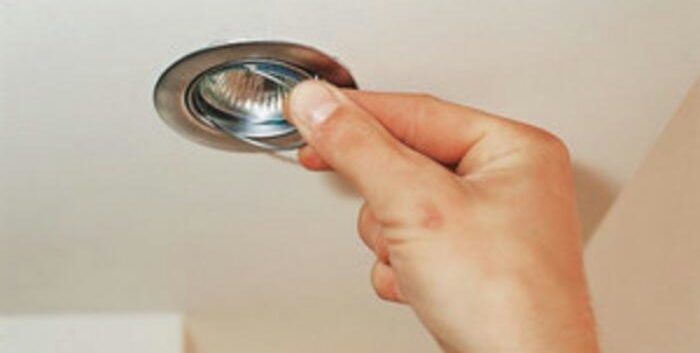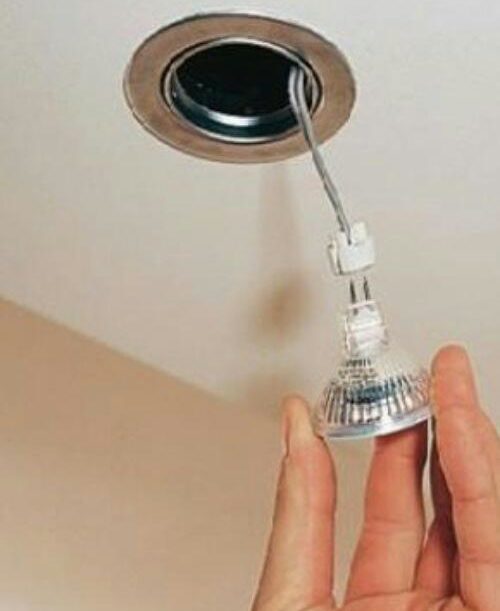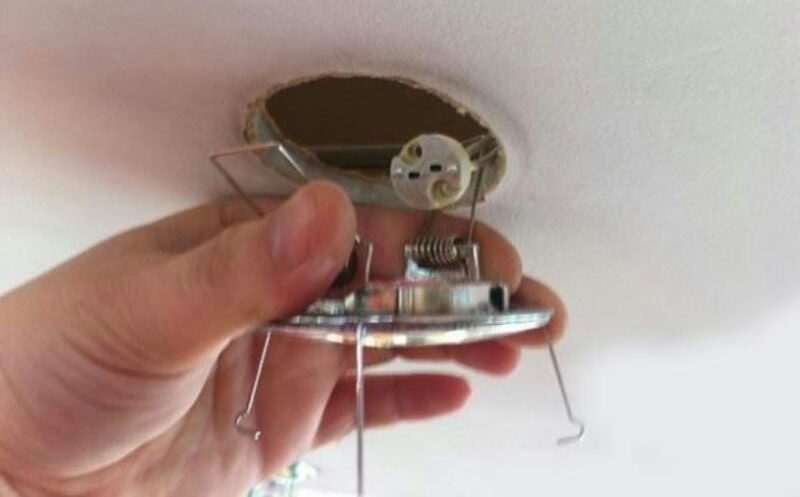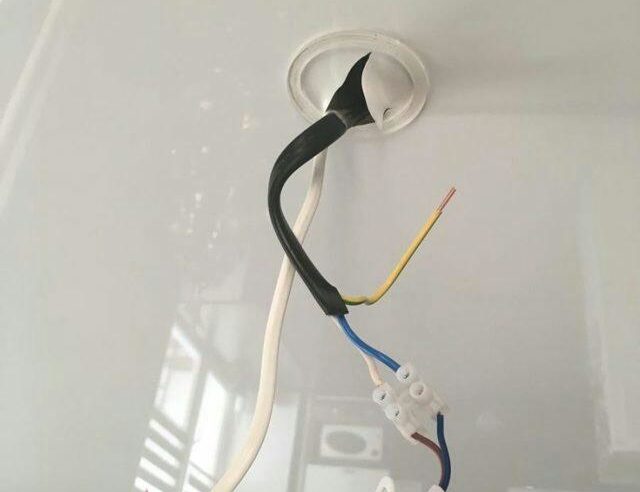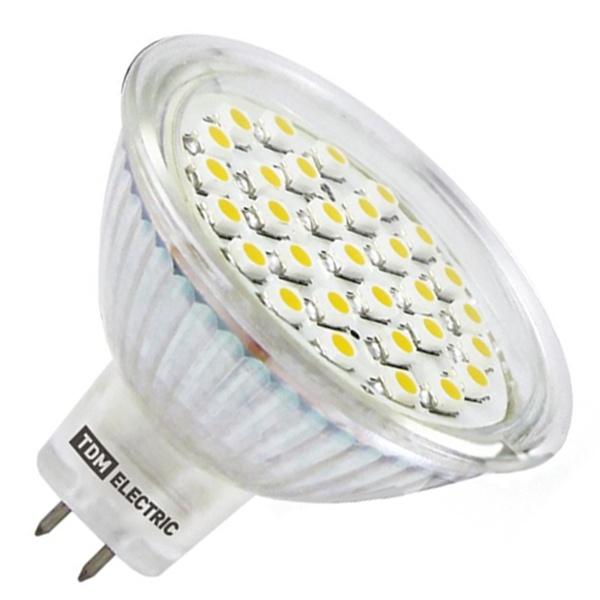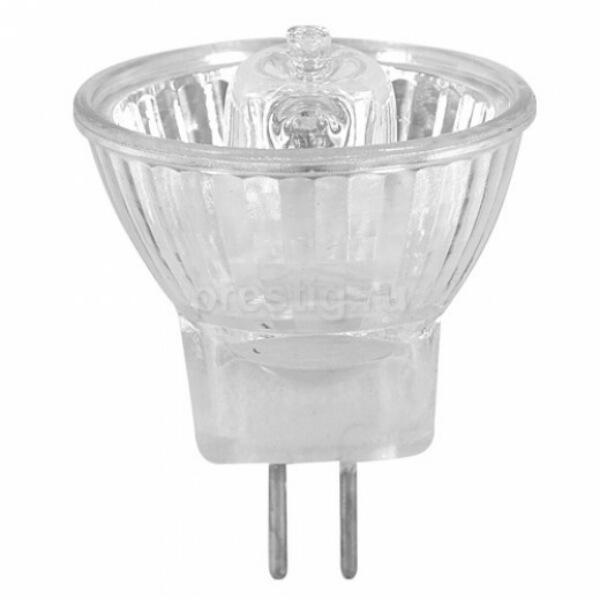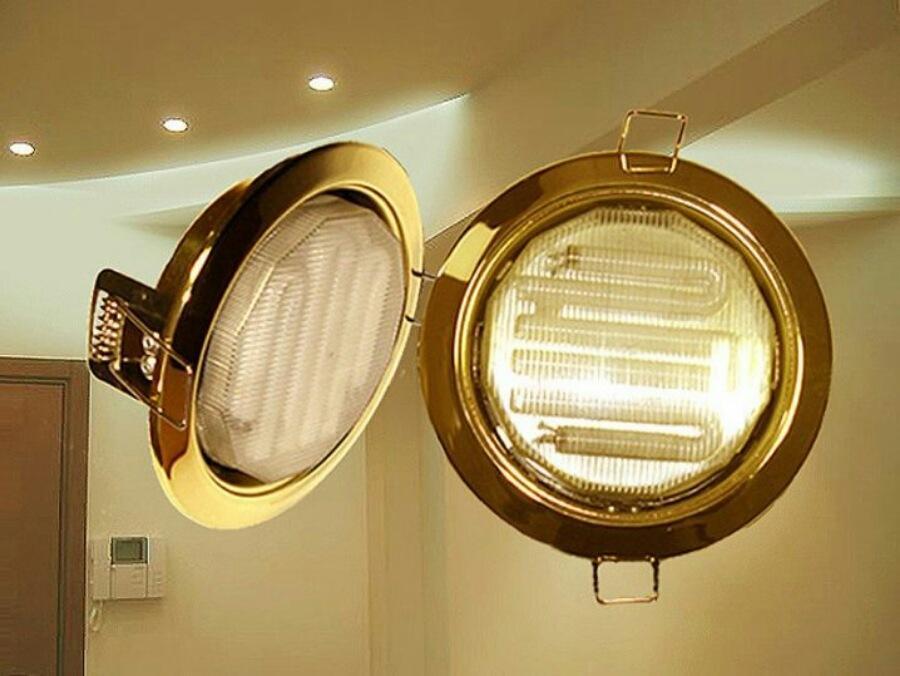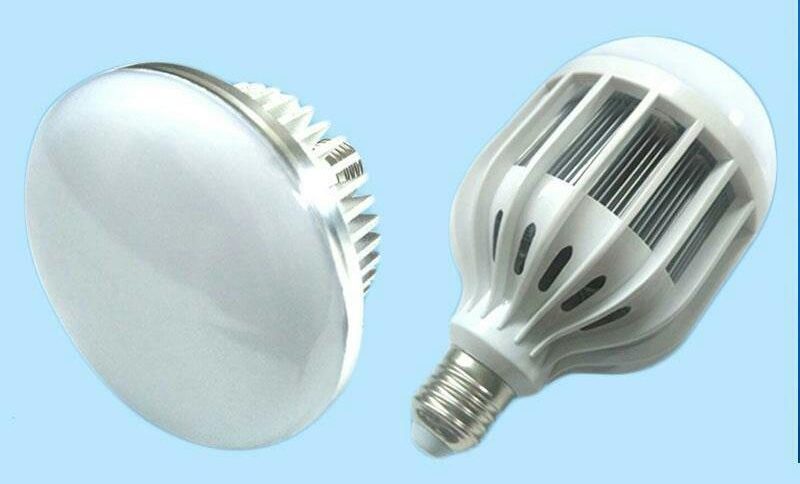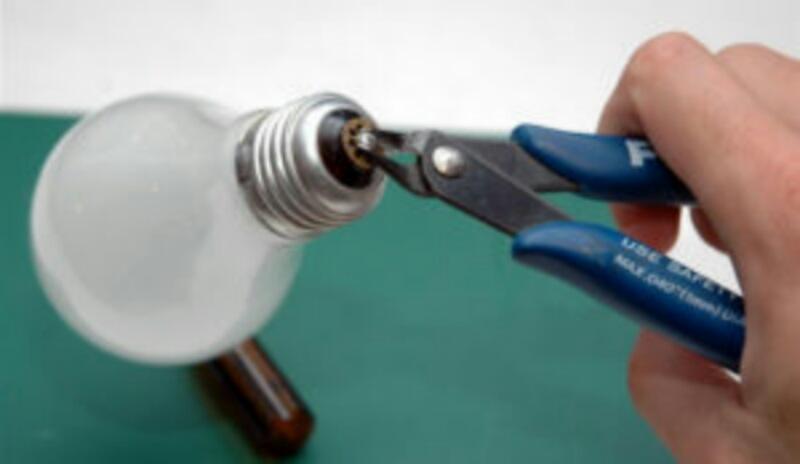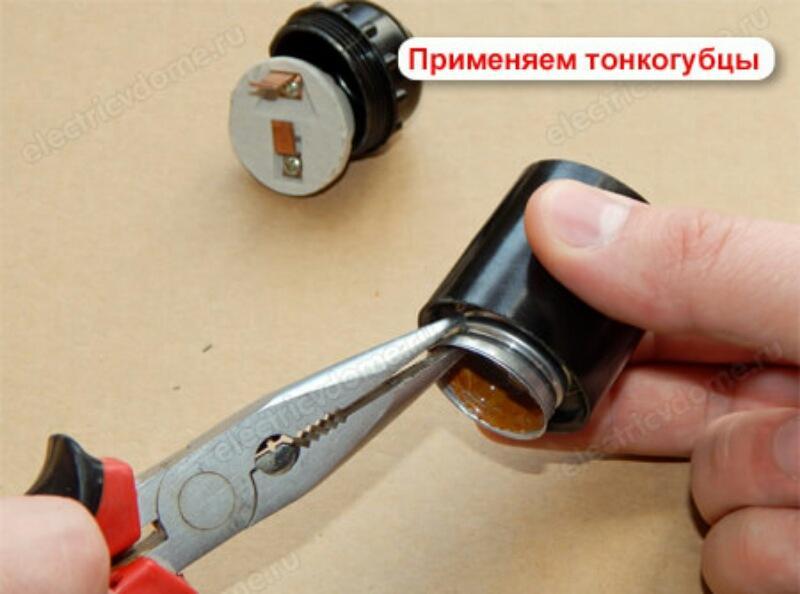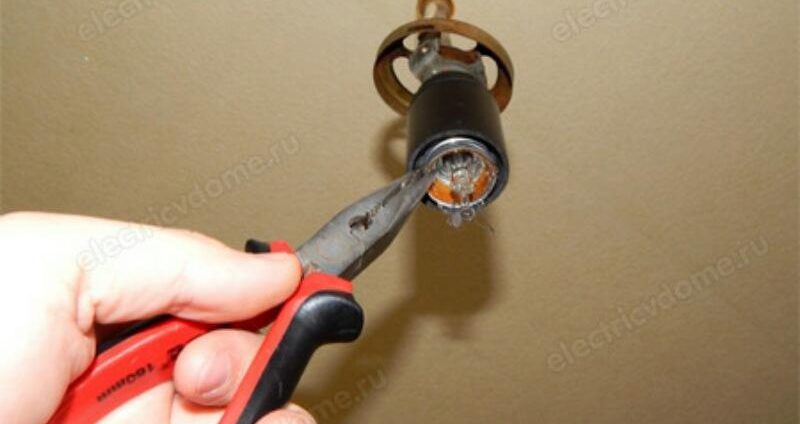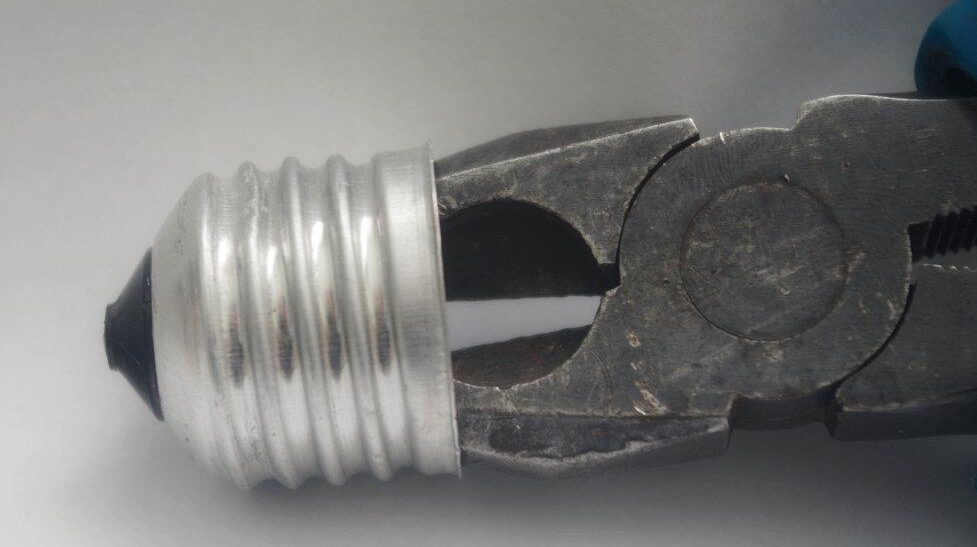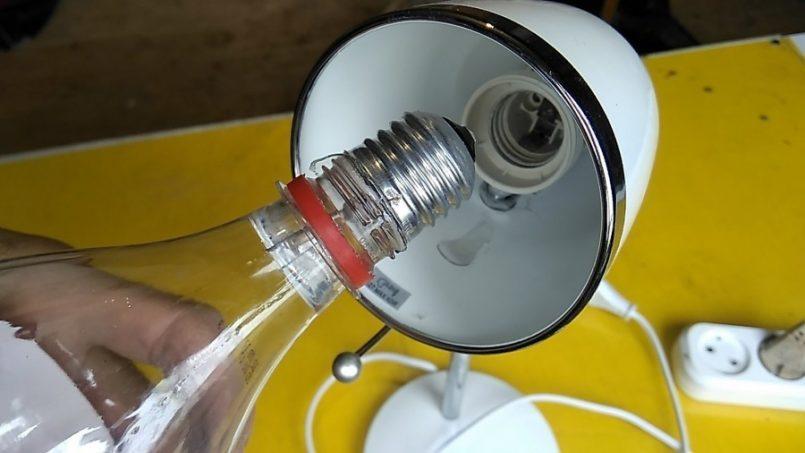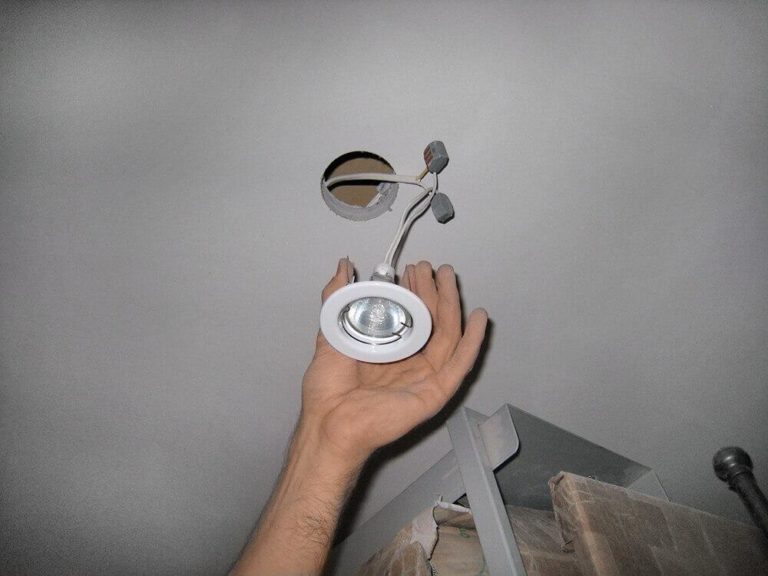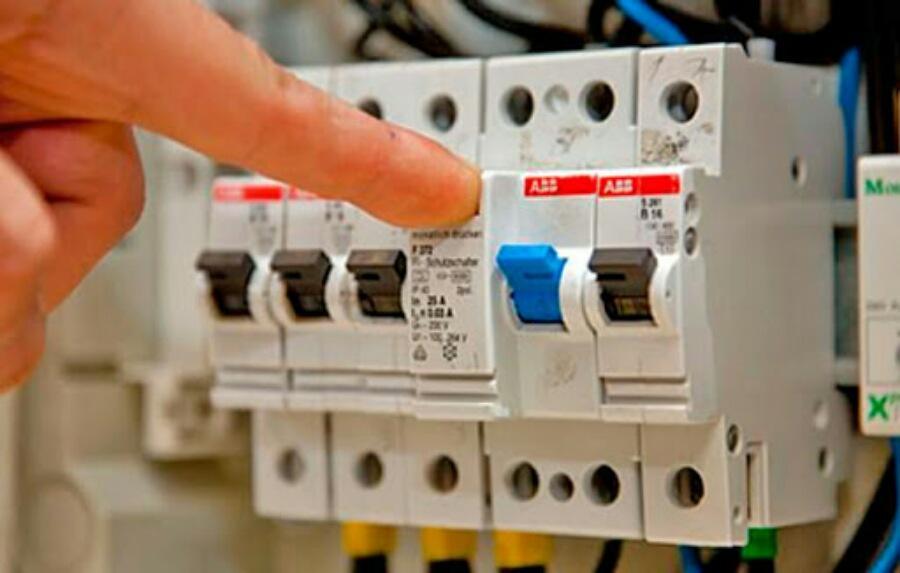Features of lamp bulb replacement in a suspended ceiling
Ceiling structures of suspended and suspended type are equipped with different types of lighting devices. The most common are soffits - small spot lights of low power, arranged in a certain order. Distributing them around the ceiling and walls, directing beams of light or dispersing them, designers zoning the space.
As a result, one square meter room sometimes has 1-2 light sources that need routine maintenance or replacement in case of failure. Perform this task without knowledge of electrical engineering and the design of a particular model is difficult, but possible. The plasterboard ceiling, although fragile, but still allows for manipulation by a layman with minimal damage to the structure, while the stretch ceiling does not forgive mistakes, and in the case of a puncture or cut can burst along the way. The situation is complicated by differences in the design of fastening systems used by different companies, so it is necessary to consider the features of the main types and models.
How to remove the bulb from the stretch ceiling
The easiest way to unscrew a bulb with a screw base from a suspended ceiling that can withstand the heat of incandescent and halogen lamps.
| Type | Diameter (mm.) | Name |
| E5 | 5 | Micro-ring (LES) |
| E10 | 10 | Miniature base (MES) |
| E12 | 12 | Miniature Base (MES) |
| E14 | 14 | "Minion (SES) |
| E17 | 17 | Small Elements (SES) (110V) |
| E26 | 26 | Middle base (ES) (110V) |
| E27 | 27 | Medium base (ES) |
| E40 | 40 | Large base (GES) |
Tensioned soffits most often use small LED or halogen bulbs with an E14 base, as heating from standard E27 bulbs deforms the plastic surface. Such a base is unscrewed by turning counterclockwise. In some models, the lamp is protected by glass, which is attached in a ring with a thread screwed into the soffit body. To access the light source, you must first unscrew the ring with glass, holding the frame of the housing with the other hand, and only then unscrew the bulb. The standard E27 format implies the use of LED bulbs only, repeating the shape of an incandescent bulb.

Replacement of MR16, GU5.3 lamps

The two-inch multifaceted reflector of the MR16 lamp disperses the light in individual beams or in a general flux in a certain direction. The design was originally developed for overhead projectors, but later found use in studio and home lighting. It is most often equipped with 12 V halogen bulbs of 20-40 W or LED bulbs of 6, 12, or 24 W. The MR16 variant for spotlights has a GU 5.3 pin base with a pin spacing of 5.3 mm.
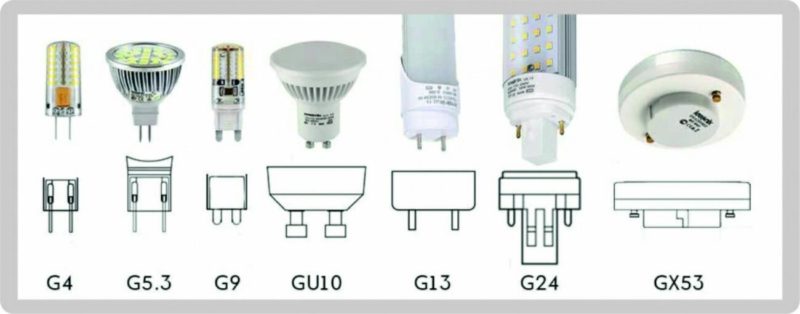
The GU 5.3 pins are inserted into the ceramic socket.
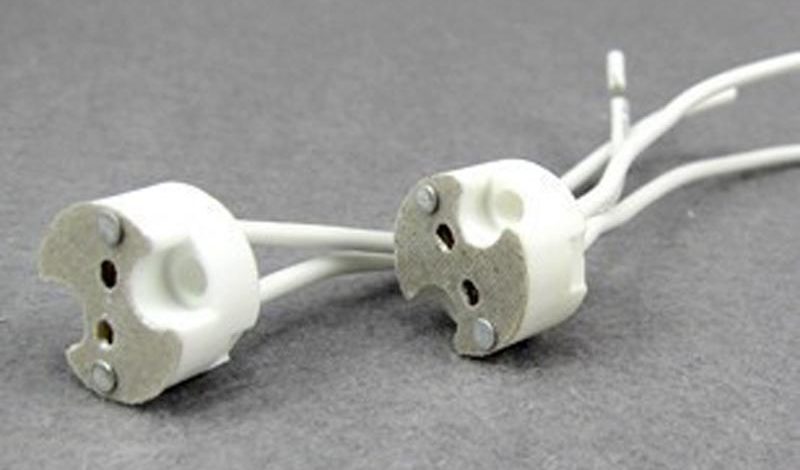
To replace the MR16 bulb in a suspended ceiling, it is not necessary to take out the entire fixture. It is fastened in the soffit body in two ways:
- By means of an internal locking metal bracket.To remove the MR16 you need to squeeze the tabs of the bracket with your fingers or pliers and pull it down.
- By means of a concealed threaded ring.The ring is notched for easy unscrewing/screwing.
Light source replacement without removing the lamp is done in the following order:
- The room is de-energized by unscrewing the plugs or turning off the toggle switch in the circuit breaker on the meter.
- Place a table, chair or stepladder underneath the device for easy access.
- Hold the soffit body with one hand and with the other hand remove the retaining clip or unscrew the threaded inner ring.Removing the retaining ring.
- Pull the pins of the plinth out of the connector. To do this, the MR16 must be pulled down, holding the ceramic connector with your fingers.The bulb, having no support, falls down under its own weight, being held on the wire, which has a margin of 20-30 cm.Pay attention! The attachment of the wire to the socket is unreliable, so you can not pull on the wire.
- The new light source is inserted with the pins into the socket until it clicks into place.
- The bulb is driven into the seat, the wires are placed in the void on the platform.
- MR16 is fixed with a retaining clip, installed in a special groove on the inner perimeter of the body of the spot or a ring with a thread.
If the groove for the bracket or the thread for the ring is blocked by the lamp, you need to take it out and check if the wires are caught between the bulb body and soffit.
Replacing GX53 type bulbs (pellet)
The tablets have a flattened shape, which allows their use in rooms where it is necessary to save space between the supporting structures and the suspended ceiling. The tablets use LEDs as a light source, for which a power supply unit is installed in the body of the device. GX53 is a pin base format, with a pin spacing of 53 mm. At the ends of the pins there are thickenings for fixation in the rotary slots of the connector.
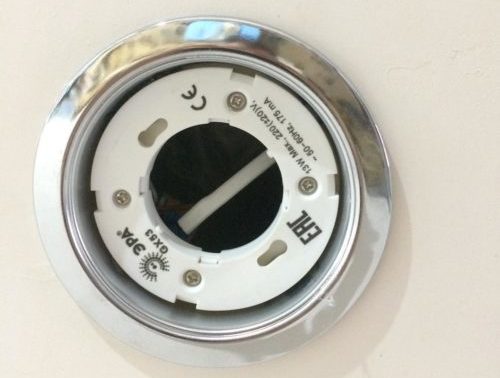
The process of replacing soffit with GX53 base is similar to replacement of the starter on daytime discharge tubes.
In order to change the bulb type tablet in the ceiling light fixture is necessary:
- De-energize the room.
- Holding the body of the spot turn the tablet counterclockwise 10-15 degrees to the stop and pull it down.Rotate counterclockwise.
- Install the serviceable light bulb by aligning the pins with the slots on the connector in the area of their extension and turn the tablet clockwise until it stops and clicks into place.
The design of the device is simple, but has a disadvantage. At the contact area of the pins with the connector over time, soot can form, which causes the lamp to start flashing and periodically goes out. To avoid this, the pins must be periodically taken out and cleaned of oxide on the pins. In poor-quality models, the tab in the connector gets stuck in the extreme position and you have to pull it with a hook, and if it fails, to change the entire cartridge. Otherwise, tablets are considered the easiest to use spot lights.
Replacing a light fixture in a suspended ceiling
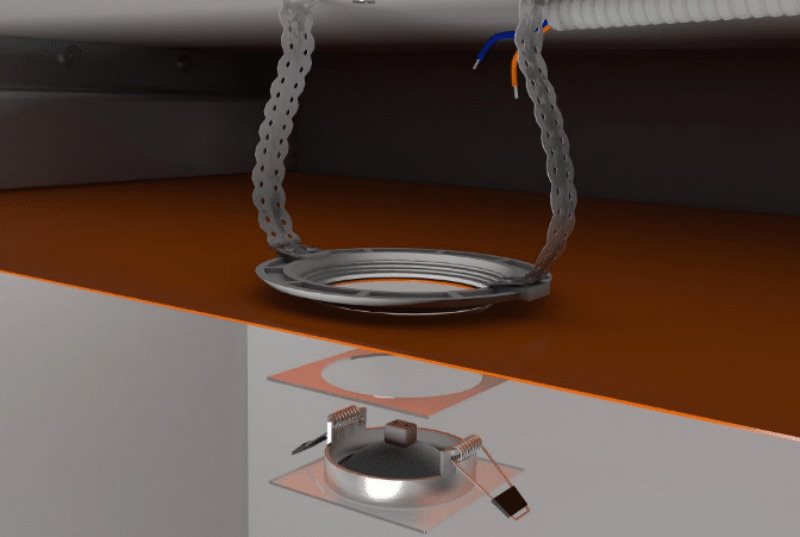
Ceiling spotlights, mounted flush with the tensioned canvas are mounted on a special platform attached to the supporting structure. The soffit body is held by two springs that press the light to the platform.

The load on the fabric of the stretch ceiling in this case is minimal. To strengthen the fabric on the edge of the hole glued protector and thermal insulating rings, but even with them, the attempt to extract the lamp can end in a tear of a thin fabric. To avoid damage, the following procedure should be followed when replacing spotlights:
- De-energize the lighting circuit.
- Use a flat screwdriver to gently pry up the edge of the spotlight and pull it down with your hands with a slope to one side.
- Pull one edge and, holding one of the spacer springs with your finger, pull out first one spring and then the other.
Make sure that the springs do not get caught in the gap between the platform and the fabric, as this could cause the fabric to tear if you try to pull it out.
- If the luminaire is equipped with LED backlighting or the lamp operates through a transformer, the power supply unit will pull out along with the wires.
- After disconnecting the wires from the terminal block with a screwdriver, you must place the stripped wires of the new lamp into the connectors and tighten the screws on the terminal block.
Or tighten the plastic clip if the Wago terminal block is used.

The power supply from the contour light is connected in parallel connection with the main bulb to the 220 V mains.
- After connecting the conductors from the cartridge to the mains, the light is mounted in place. To do this, both springs must be pressed upwards and, holding them with one hand, tuck the wires with the power supply or transformer into the space on the platform. The springs are wound around the body of the fixture and released.
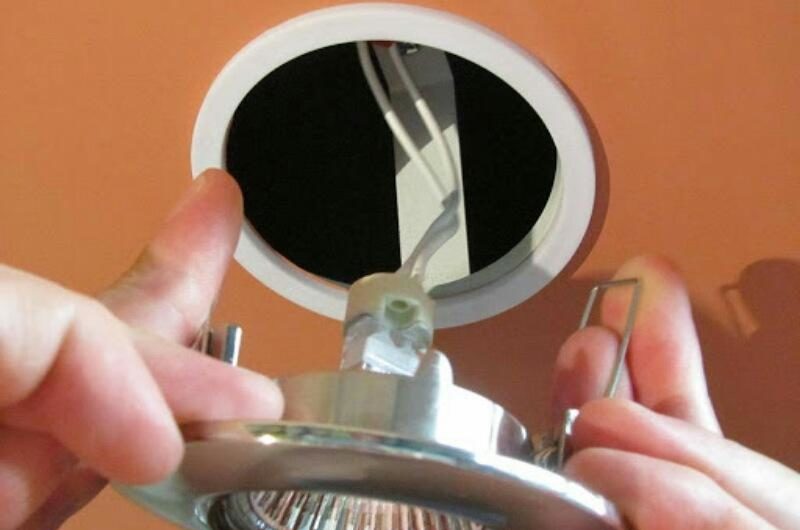
Make sure that the springs do not spread out under the cage, otherwise the light will hang on the stretch ceiling. Also the webbing will sag if the transformer has fallen from the padding pad onto the fabric. This can manifest itself later, when under the weight of the device polyvinylchloride will sag at the point of greatest pressure. In this case, the body of the spot should be removed, re-lay all the elements of the circuit on the pad and place the soffit on the landing place in the same order.
How to change the bulbs in a suspended ceiling
Plasterboard structures are more rigid, but it is better to avoid frequent manipulation with light fixtures, as in the place of the hole the plaster will eventually pucker out. The basic principles of dismantling and installing spotlights on plasterboard ceilings are the same as on stretch ceilings. Differences in performance techniques relate only to the design of the spotlight and the light source.
LED
LED cells are gradually replacing previous generations of lamps due to their cost-effectiveness, but they have a significant drawback: cheap devices have a flicker factor of more than 15%, which is noticeable when shooting video. Eyes from such light are very tired, and the vision eventually sits down. In this regard, it is better not to save money when choosing models for lighting living and working spaces. The design of LED light bulbs implies the presence of a driver in the body, so the devices work directly from the 220 V network, and the lighting circuit does not need additional stabilizers and rectifiers. When replacing the LED light bulb is enough to simply remove it in the manner specific to the type of a particular socket and install a new one in its place.
Halogen
With high power consumption and a low life of 5000-10,000 hours, this source has optimal characteristics for vision. The warmth of halogen light is in the comfortable range of 3000-4000 K. In addition, their flicker factor is most often less than 5%, but only if high-frequency transformers and voltage regulators are used. In some cases, the failure of a halogen bulb is due to the failure of the rectifier. Therefore, if after replacing the bulb the lamp does not work, you need to check for operability of the other elements of the lighting circuit.
Fluorescent
Gas discharge light sources are rarely used for spot lighting, because of their compactness associated with low power. Their principle of operation implies the presence in the lighting circuit of a ballast, usually starting a group of several fluorescent bulbs at once. There are samples with built-in ECG, but its dimensions increase the distance between the main ceiling and the suspended ceiling.
Most often these lamps have a screw base E14, so their replacement is not difficult.
How to change a bulb in a spotlight
For studio and design lighting we use spotlightsFor studio and design lighting, we use spotlights that can be fixed to the ceiling or wall surfaces either directly through the fabric to the platform or by means of a mounting bar.
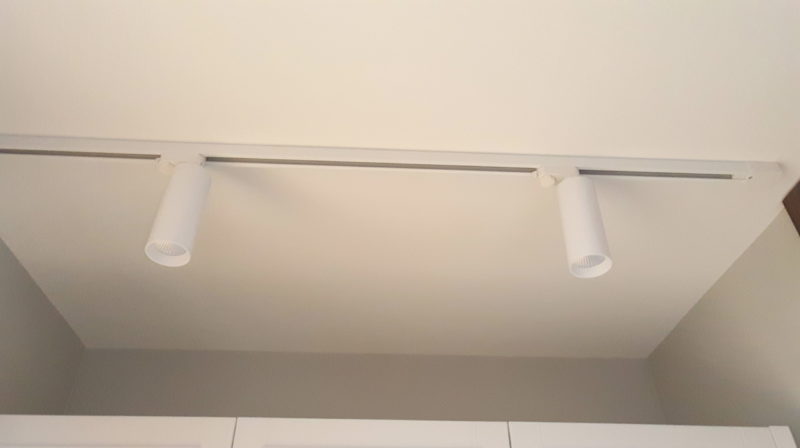
Feature of the spots is the ability to adjust the direction of the spot light by turning the lamp body on the hinge. Bulbs in such devices are held by fixing in the socket, and to remove them, a special vacuum applicator, which is a suction cup, is provided.
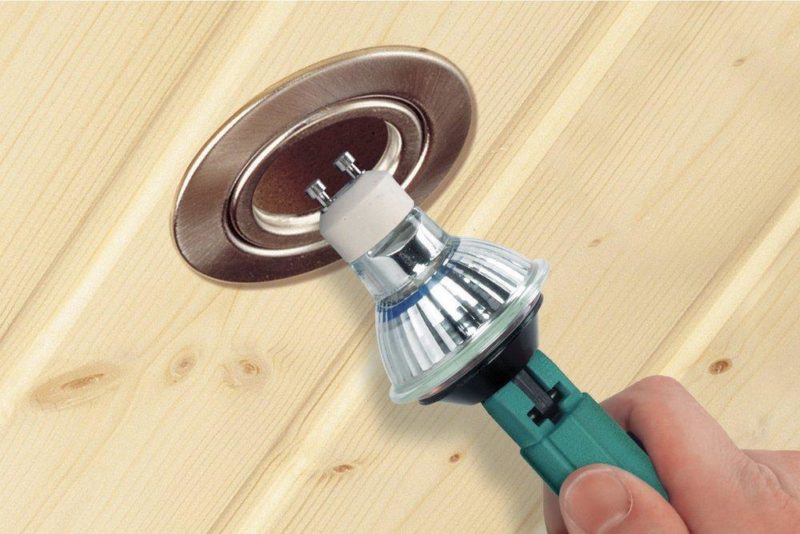
The replacement process is quite simple:
- The circuit is de-energized.
- A suction cup is pressed to the plane of the bulb.
- Depending on the type of socket the suction cup is pulled towards you (for GU5.3) or turned counter-clockwise by 15-20 degrees and pulled out (for G10).
- The new light source is installed in reverse order. If the base is pinned, such as GU5.3 or G9, the bulb is simply inserted until it locks into place. If the base is screwed, it must be screwed all the way in (for E14) or clicked in like the G10 or GX53.
If no applicator is available, you can remove the lamp by taping it as in the photo.
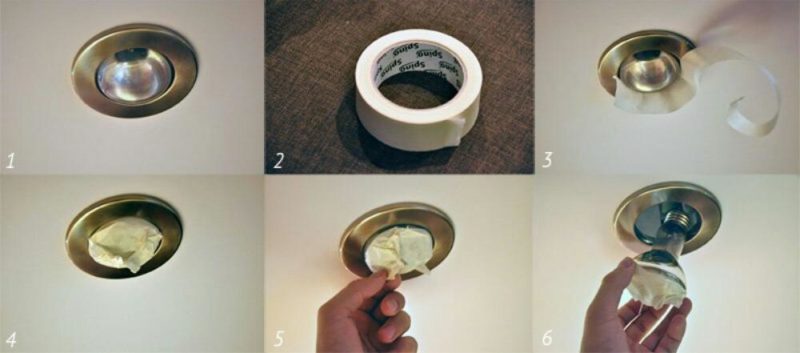
How to unscrew a burst bulb
If when unscrewing the bulb, the glass bulb broke or came off the base, leaving it inside the socket, you can take out the base in several ways:
- Disassemble Disassemble the entire body of the device, unscrew the socket and unscrew the base, holding it with pliers by the protruding contact.Then by the protruding edge on the back side.
- Without disassembling the appliance, if the lip protrudes enough to be grasped with the pliers.
- After breaking the glass inside of the flask, undo the base with the pliers from the inside and twist.
- Melt any plastic part with a lighter and insert it inside the base. For E27 you can use a bottle, for small E14 you can use a fountain pen.After the plastic hardens, you can try unscrewing.
For small halogen cartridges, you will need round pliers or pliers with thin tongs. Be careful not to deform the thin metal inside the socket.
Selecting a new light source
The easiest way to replace the halogen with an LED with the same type of socket. To do this, it is enough to remove the transformer from the circuit, as the LED operates directly from the 220 W mains. It is more complicated when instead of a two-inch MR16, you have to put a wider in diameter tablet GU53. To do this, you need to glue a new tread ring around the small old one and trim off the excess fabric. If the main ceiling is fitted with a universal tab, it is sufficient to cut a new hole along the line on the pad with a stationery knife.
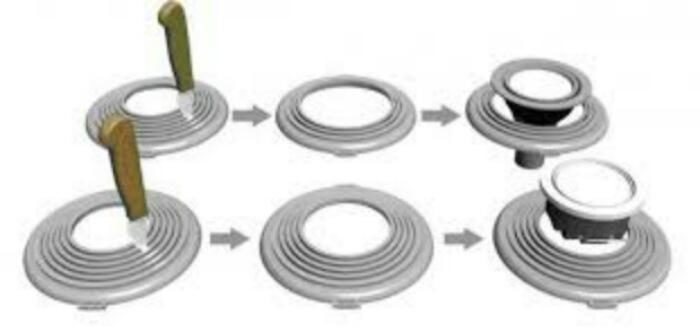
In the case of homemade pads, it will most likely be necessary to remove the canvas, as it will be difficult to cut a new landing without damaging the fabric of the stretch ceiling.
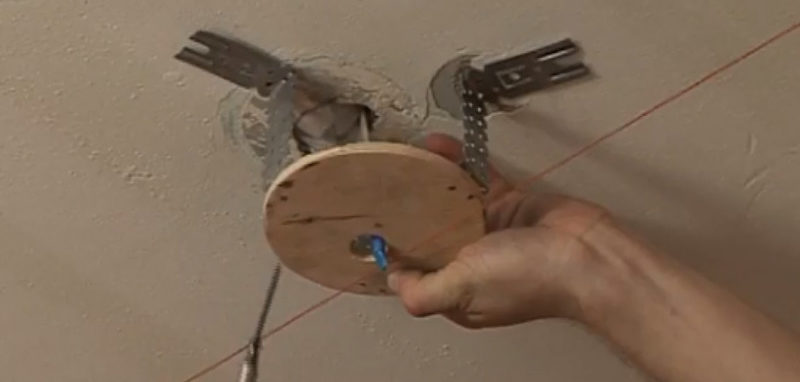
In some cases, you can install overhead spotlights or a chandelier on a homemade overlay.
Safety precautions
In all cases, without exception, before manipulating with lighting fixtures need to de-energize the room, turning off the machine or unscrewing plugs in the counter.
There are at least two objective reasons for this:
- Light switches sometimes break zero rather than phase. If an earthed body comes in contact with an active phase, an electrical injury can occur.
- If moisture has accumulated on the suspended ceiling, an electric shock through the wet body of the light fixture is possible. This happens most often in apartment buildings when the upstairs neighbor floods the apartment below.
To reinforce the information thematic videos.
If for some reason it is impossible or too difficult to completely disconnect the voltage in the house, then all manipulations are carried out in tight rubber gloves, with the switch off beforehand and checking the voltage with a screwdriver indicator. To protect your eyes from fine debris from the ceiling, it is advisable to wear construction goggles. It is best to connect the wires through the terminals, tin-plated the contacts beforehand. Use stranding, insulated with tape fraught with overheating wires in place of stranding, melting the insulation and bare conductors, followed by a short circuit.


